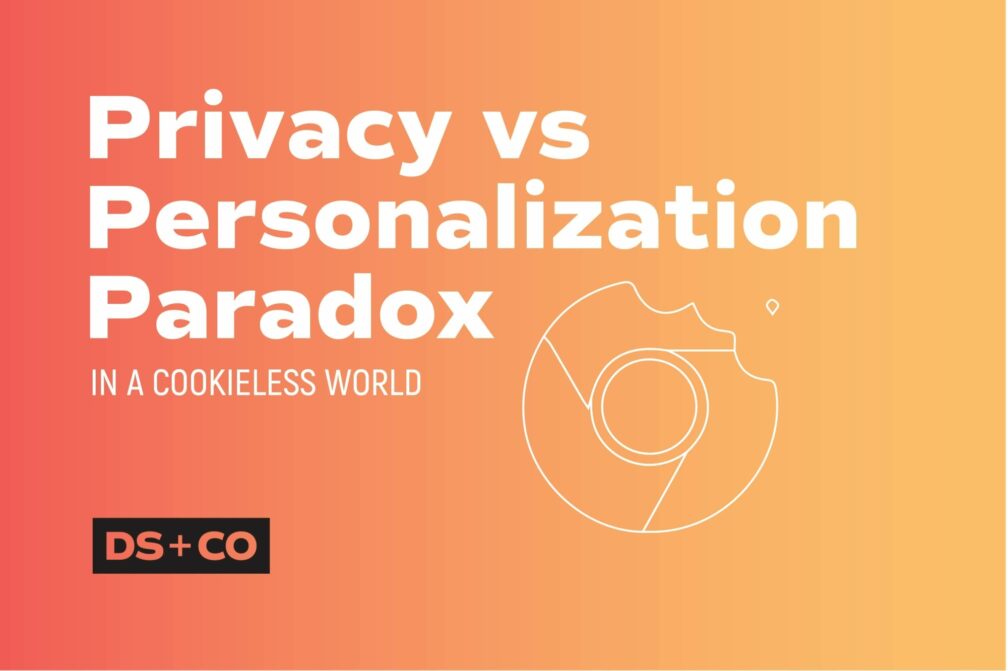Blog
Marketing

The privacy vs personalization paradox in a cookieless world
The Cookiepocalypse was delayed until late 2023. Go ahead and breathe a big sigh of relief, but don’t get complacent. This gave marketers a bit of breathing room, but alternative options for targeting in the future are still being developed. Google stated that the delay was so they could get it right, for the industry and for protecting user’s privacy. When Google first announced that we were going cookieless, companies started creating options for cookie alternatives, essentially a new version of 1:1 identifiers, like The Trade Desk’s Unified ID Solution which kind of defeated the purpose of Google’s cookie depreciation in the first place – protecting user privacy.
Google’s decision to depreciate cookies has raised more than a few eyebrows in the martech community. Google holds a pretty hefty share of global ad revenue, and also has a lot of its own first party data. Google Chrome accounts for roughly 70% of browser share, depending on who you ask. If you think about how many Google products you may personally use, it’s safe to say that Google knows a lot about you. And a lot about everyone. Google says it is trying to do, is get away from individual targeting, and move the industry toward cohort targeting. As government regulators continue to scrutinize “big tech” in an effort to protect citizen privacy, Google knew it had to make a move. Google’s move may be a bit self-serving - to protect its own advertising revenue by still allowing marketers to target, but also to protect itself from being regulated.
You may have heard the phrase “walled garden” used in discussions about what’s going to happen when cookies go away.
Many websites that advertisers use heavily - social media sites like Facebook, LinkedIn, and others, allow advertisers to reach that site’s users with the data that lives within this “walled garden.” Facebook lets advertisers target people with “likes or interests” but doesn’t exactly reveal all of the details of how they gathered that information. And the details of that targeting are not relayed back to advertisers in a granular way. Google, which knows “everything about everyone,” may be poised to do the same thing. But Google is presenting itself as doing it “responsibly.”
The question is, is it possible to create a better system of targeting by eliminating cookies and that 1:1 relationship? Google’s cohort targeting method (FLoC) has been criticized by many in the industry as still being able to be used to identify individuals on a 1:1 basis, if the FLoC is paired with unique sign-on data. The more altruistic goal of eliminating cookies is eliminating the ability for users to be targeted “against.”
In October 2020 Google updated its ad targeting policies to protect people from being targeted in discriminatory ways. It followed on the heels of Facebook making these changes in late 2019. As Google builds its FLoC, which is created based on machine learning, it is also building in “safety switches” to ensure that these cohorts can’t be used to discriminate. There’s been some skepticism from the industry as to whether this will actually provide protections against discrimination. We think this is one of the reasons why Google kicked their cookies plan a bit further down the road.
There are a few main points to take away from this:
- 1:1 identifying is going away, unless you’re using your own first party data (we can help). The possibility of another 1:1 option has been shot down with Google’s June announcement.
- Get ready for more walled gardens - since third party data won’t available this is going to increase advertiser reliance on working with sites and publishers that have their own first party data.
- Get ready to test FLoC. Build and establish your campaign performance baselines now. Know what’s working for you and what’s not, so you can have metrics to compare to FLoC targeting when it’s available for use by advertisers.
Need help getting started with assessing your readiness? Hit us up.
Erin Haskell
Erin Haskell is DS+CO’s media supervisor focused on strategy, planning and buying that drive results for her clients.